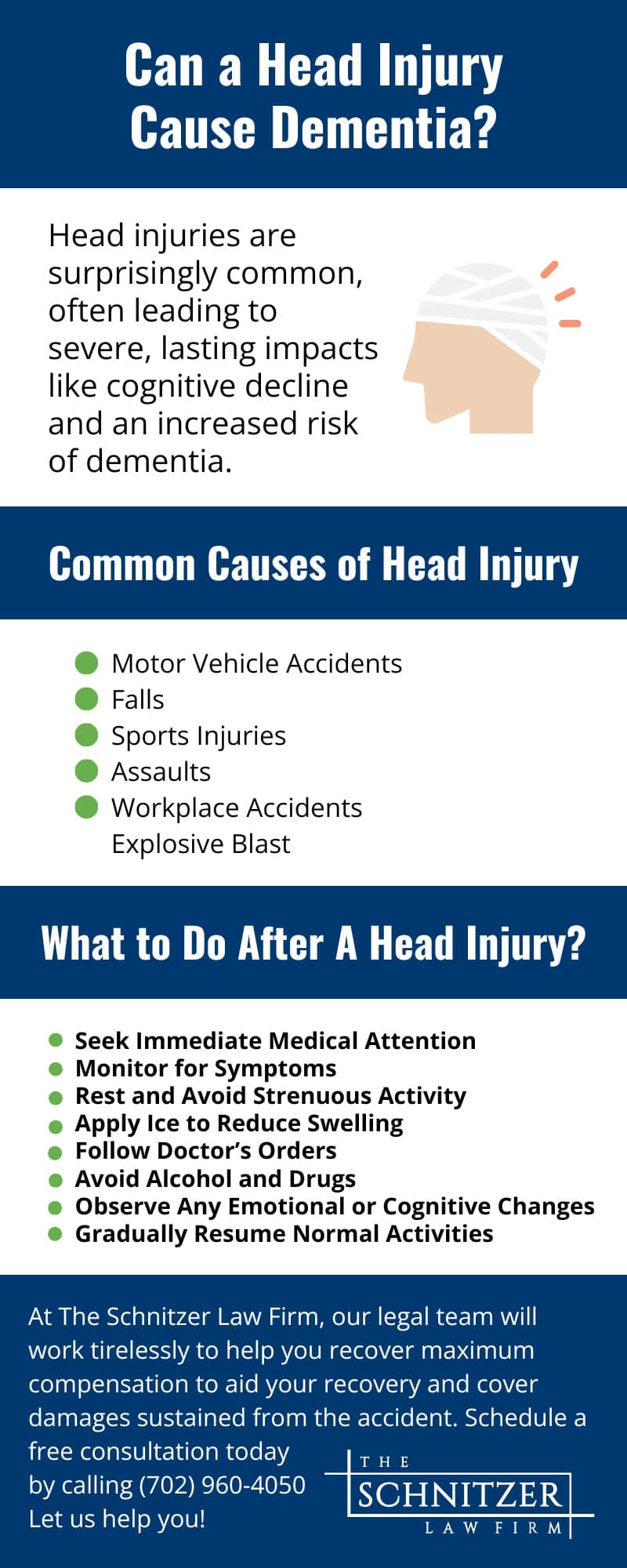Head injuries are more common than most people realize, and their effects can be long-lasting and severe. They are considered some of the most serious and life-altering injuries a person can sustain, often disrupting normal cognitive function, emotional stability, and overall quality of life. One of the most serious effects of these types of accidents is the risk of developing dementia later in life, particularly dementia from head injury.
What Is the Connection Between Traumatic Brain Injuries and Alzheimer’s?
Traumatic brain injuries (TBIs) have been closely linked to an increased risk of Alzheimer’s disease. According to the Alzheimer’s Research Association, individuals who have experienced moderate traumatic brain injuries are twice as likely to develop the disease later on. At the same time, those with severe TBIs are 4.5 times more likely. This raises the question: “Can TBI cause dementia?” If you or a loved one has suffered a traumatic brain injury in Las Vegas, understanding the potential long-term effects, including dementia, is crucial.
This connection is partly due to the nature of TBIs, which often result in long-term inflammation and changes in brain chemistry and function. TBI symptoms that mirror those of dementia include:
- Memory Loss
- Mood Swings
- Inability to Complete Tasks
- Following Instructions
- Solving Problems
This suggests that symptoms can speed up or worsen the development of conditions like Alzheimer’s.
What to Do After A Head Injury?
After experiencing a head injury, following these steps is crucial to help ensure proper care and further damage:
- Seek Immediate Medical Attention: Get medically checked immediately if the injury is severe or if you experience symptoms like loss of consciousness, confusion, vomiting, severe headache, or seizures.
- Monitor for Symptoms: Watch for signs of a concussion, even if the injury seems minor. Symptoms can appear hours or even days after the injury.
- Rest and Avoid Strenuous Activity: Avoid physical and mental activities that could result in another injury or require intense concentration until symptoms improve.
- Apply Ice to Reduce Swelling: Apply a cold compress to the swollen area for 15-20 minutes every few hours to reduce inflammation.
- Follow Doctor’s Orders: If you have been medically evaluated, following the doctor’s orders is essential for the best recovery.
- Avoid Alcohol and Drugs: Alcohol and certain drugs can slow recovery or exacerbate symptoms, so it’s best to avoid them while healing from a head injury.
- Observe Any Emotional or Cognitive Changes: Head injuries can cause mood, memory, and cognitive changes. Seek medical advice if you notice prolonged emotional issues or difficulty thinking clearly.
- Gradually Resume Normal Activities: Once symptoms have subsided, gradually resume your normal activities. Avoid any activities that could heighten the risk of another injury, especially contact sports.
After a head injury, it’s important to take the right steps to prevent further complications and support a full recovery. Whether the injury seems mild or severe, getting timely medical care and monitoring can make a big difference in avoiding long-term consequences like traumatic brain injuries, which may increase the risk of dementia or other cognitive issues later in life.
What Are the Common Causes of Head Injury?
Several factors contribute to head injuries, particularly traumatic brain injuries (TBIs), which can increase the likelihood of developing dementia over time. Some of them include:
- Motor Vehicle Accidents
- Falls
- Sports Injuries
- Assaults
- Workplace Accidents
- Explosive Blast
Understanding the common causes is essential in reducing the risk of repeated trauma.
Consult With A Legal Expert
If you’ve been a victim of a head injury due to someone else’s negligence, seeking legal support from a highly skilled Las Vegas personal injury lawyer is vital to ensure you get the justice you deserve.
At The Schnitzer Law Firm, our legal team will work tirelessly to help you recover maximum compensation to aid your recovery and cover damages sustained from the accident. Schedule a free consultation today by calling (702) 960-4050. Let us help you!
